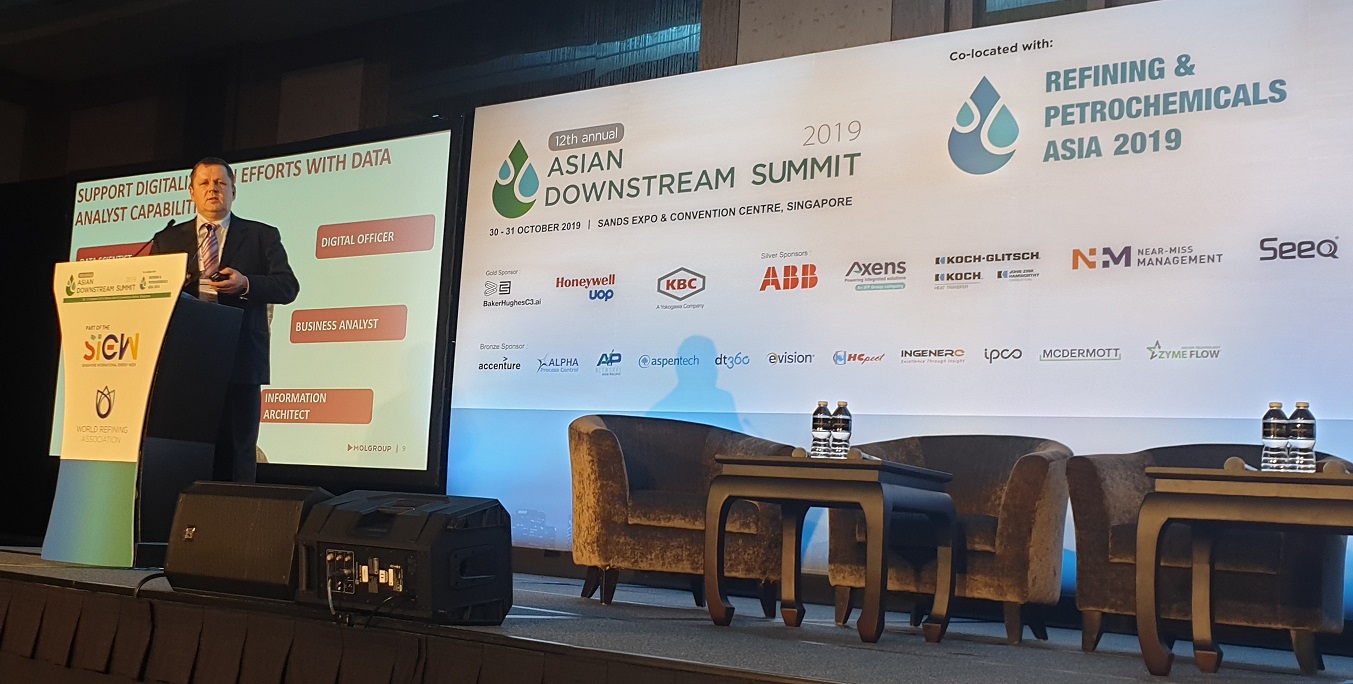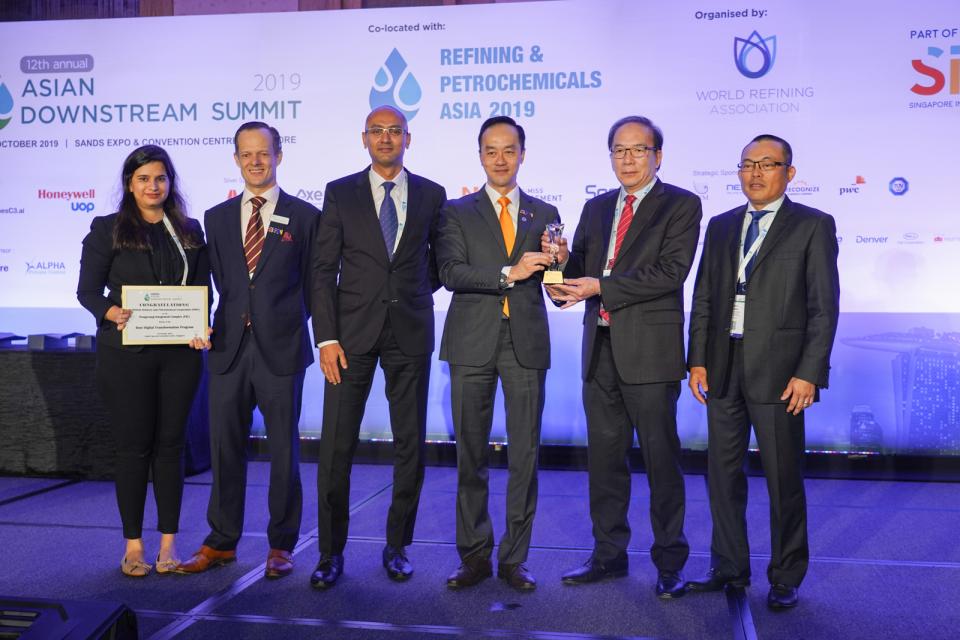

The 12th edition of the annual refining & petrochemicals themed conference and exhibition in Singapore saw Asian Downstream Summit continue its evolution from a primarily plant process equipment focused event to one with a strong digital technology and transformation theme.
This refocus, which began in 2016, has been successful to the extent that Asian Downstream Summit (ADS) now almost exclusively concentrates on digital topics, and in 2019, a new co-located conference, Refining & Petrochemicals Asia (RPA), became the repository for core refining and petrochemical technologies, equipment innovations, and project trends and updates. The two conferences and (shared) exhibition attracted just over 1,200 visitors, 92 speakers and 35 sponsors/exhibitors.
With that deeper digital theme, Asian Downstream Summit provides an opportunity to see, hear and learn from downstream oil & gas companies engaged anywhere on the spectrum from selective Industrial IoT technology adoption right through to ambitious, organization-wide digital transformation. So let’s take a look at the key end-user experiences and perspectives revealed at ADS 2019.
Fuad Al-Ansari, Vice President, Information Technology Division, said the driver for digitalization at ADNOC, which runs three refineries in the United Arab Emirates, was the need to double production capacity and to cope with increasing operational complexity. With objectives including better visibility of plant processes, benchmarking of actual vs planned production, and enabling users to analyze rather than chase information, ADNOC developed IRIS (Integrated Refinery Information Systems), with Honeywell as its technology supplier. With this digital foundation in place, future planned deployments include predictive maintenance, enterprise analytics, mobile workforce, and augmented reality.
Renato Goebel, Head of Asia Pacific, also spoke about the company’s digital transformation journey. A key aspect for the Brazilian petrochemical company is the Digital Center (currently 33 staff), which was created to accelerate all digital initiatives, develop new ventures, and be a catalyst for change. Five important digital transformation lessons learned: 1. Have a digital strategy in place and make sure it is driven by the CEO; 2. Bring workforce into the digital age and manage cultural change; 3. Collaborate in digital ecosystems and accelerate partnerships; 4. Fail fast, fail cheap; 5. Invest in use cases, not technologies.
As described by Giacomo Silvestri, Digital Strategy & Innovation Lead, the Italian oil & gas company’s digital agenda has the strategic goals of excelling in asset integrity and safety, enhancing all performance drivers, and enabling decarbonization and energy transition. With Digital Safety, for example, the aim is to achieve superior safety standards, predicting, preventing and avoiding unsafe employee behaviors. The technology enablers for Digital Safety include virtual reality (for operator training), robotic inspections, and smart helmets. An important aspect of Eni’s digital journey is actively scouting for digital trends and making efforts to more fully comprehend the digital transformation landscape. Interestingly, in this respect, as well as looking at its oil & gas industry peers, Eni finds valuable digital learnings can be had from outside the sector from companies in areas as diverse as banking, retail, e-commerce, and automotive. For its Digital Agenda 2019-22, the company is targeting an economic impact of €1.1 billion by the end of 2022.
While ExxonMobil did not delve into its own digital journey, Bradley Houk, Senior Engineering Advisor & Open Process Automation Project Manager, did provide details on the Open Process Automation (OPA) initiative spearheaded by the American energy giant. His update on progress towards the new-concept process control system centered around standards-based, open, secure, interoperable architecture revealed that the Proof of Concept is complete, the Prototype is in development, and the Test Bed is initiated − with Yokogawa as the systems integrator working with multiple technology suppliers. The plan is that the Test Bed be ready for Collaboration Partner engagement in 2020 and the test results to form the basis for Field Trials from 2021. The current industry Collaboration Partners are Aramco, BASF, ConocoPhilips, Dow, ExxonMobil, Georgia Pacific, and Linde. Mr Houk said he is keen to attract more end users in Asia to join as OPA Members.
Arun Kumar, General Manager, Asset Integrity & Engineering, focused in his presentation on the value of developing turbomachinery maintenance excellence in the plant, emphasizing that turbomachinery is business-critical equipment and with normally no standby, the only opportunity for maintenance and servicing is a planned turnaround, which in refineries is scheduled at 4-5 years of operation. This puts the onus on early detection of faults so that remedial action can be planned and executed. Citing several Industrial IoT implementations at the company, he said that turbomachinery reliability improves with digitalization and a recommended approach is to quickly identify three or four focus areas for IIoT solutions and after success, supplement with AI based analytics.

Tibor Komróczki, Head of Process Information & Automation, Downstream, emphasized the importance of embracing Industry 4.0 in order to create the sustainable refinery of tomorrow. However, challenges can be expected, including aspects such as internal organizational barriers, lack of familiarity with new technologies, and insufficient instrumentation to provide the necessary plant data. MOL’s focus is on deploying Advanced Efficiency Applications, Advanced Safety & Reliability Applications, and Refinery Information Systems. On the people side, the future skillset for plant engineers should include statistical skills and analytical thinking, in order to understand complex data and communicate information to plant operators.
Chan Tuck Leong, Head – Digital Accelerator, Downstream, discussed the Malaysian national oil company’s digital transformation journey, which is about a “new way of thinking and working” and structured around the three-Ps: identify Pain Points; initiate Pilots; and scale through the organization via Programs. The objectives are: Safety (of workers and eqpt); Efficiency (the highest possible); Reliability (through prediction); and Productivity (maximise). The current digital transformation progress at Petronas:15 pilots, 6 Programs, cost savings, and improvements in safety.
Suhas Japtiwale, Assistant VP, Refining & Petrochemicals Business, spoke about the Refinery of the Future. He identifies three megatrends that will have an impact on the refinery. Firstly, Digitalization will enable smart refining through use of technologies including Industrial IoT, analytics, digital twin, and AI. Secondly, Decarbonization will encourage the production of renewable fuels such as bioethanol and biodiesel, as well as carbon recycling (e.g. minimise refinery emissions). And thirdly, the Mobility Revolution, e.g. electric vehicles, shared vehicles, will crucially result in decreasing demand for transport fuels (forecast to peak in 2026) such that refineries will transition mainly to production of jet fuel and chemicals. This “crude-to-chemicals” trend will see the current 80/20 fuel/chemical mix change to 20/80 and have a significant impact on the downstream industry.
According to Andreas Krobjilowski, General Manager, Shell Eastern Petroleum, the company’s digital transformation initiatives at its Singapore downstream plants focus on making the facilities safer, more productive, more reliable, and improving work execution efficiency. To this end, technologies and applications deployed include drones, RFID, smart torque system, mobile sensing robot, digital twin, connected field worker and predictive maintenance. Data, people and collaboration are the key aspects of Shell's digital transformation efforts in Singapore, he stressed in his Day One opening keynote.
This year at Asian Downstream Summit, awards were given across three categories: Best Digital Transformation Program; Innovations in Oil & Gas Technology; and Young Engineer Award. The awards were presented by guest of honour Dr Koh Poh Koon, Singapore’s Senior Minister of State for Trade & Industry.
Winning for Best Digital Transformation Program was Malaysia’s Petronas for the Petronas Refinery & Petrochemical Corporation (PRPC) Digital Program, which took a digital-first approach to create the Plant of the Future and engender a Digital Way of Working by establishing Digital Assts − through technology that delivers data from the plant to enable transparency and innovation, and Digital Insights − by unlocking business value through analytics technology that pushes insights and decision making to the field.

Hexagon PPM took home the prize for Innovations in Oil & Gas Technology through its work with the aforementioned Petronas unit, PRPC, in developing the Petronas Engineering Data Management System (P-EDMS), which creates a clear and visible link between projects and operations through standardized engineering data that talks to O&M and ERP systems. Benefits include a gain of over 6,000 man-days in the data extraction phase and a decrease in safety incidents and equipment failure via automated data analysis.
The Young Engineer Award went to Edison Tan, Production Specialist – Product Blending, at Shell’s Pulau Bukom refinery in Singapore. He developed a product quality & optimizer tool for Bitumen production, which is a notoriously difficult process as quality is highly dependent on crude type. Using the new tool, operators can monitor real-time estimated quality, which is then used by the blending process units to ascertain real-time rundown quality in tanks.
Next year, in 2020, Asian Downstream Summit will continue to be a digital-themed conference while the Refining & Petrochemicals Asia conference content and emphasis will be represented by ARTC (Asia Refining Technology Conference), an existing annual Clarion Events regional show, which will now be co-located with Asian Downstream in Singapore. Taking place as usual during the annual Singapore International Energy Week (SIEW), ADS and ARTC wil be held on October 28-29, 2020.

